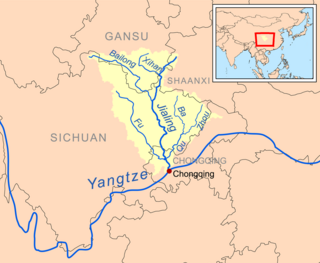
The giant panda, also known as the panda bear or simply panda, is a bear species endemic to China. It is characterised by its white coat with black patches around the eyes, ears, legs and shoulders. Its body is rotund; adult individuals weigh 100 to 115 kg and are typically 1.2 to 1.9 m long. It is sexually dimorphic, with males being typically 10 to 20% larger than females. A thumb is visible on its forepaw, which helps in holding bamboo in place for feeding. It has large molar teeth and expanded temporal fossa to meet its dietary requirements. It can digest starch and is mostly herbivorous with a diet consisting almost entirely of bamboo and bamboo shoots.

Sichuan is a province in Southwestern China occupying the Sichuan Basin and Tibetan Plateau between the Jinsha River on the west, the Daba Mountains in the north and the Yungui Plateau to the south. Sichuan's capital city is Chengdu; its population stands at 83 million. Sichuan neighbors Qinghai to the northwest, Gansu to the north, Shaanxi to the northeast, Chongqing to the east, Guizhou to the southeast, Yunnan to the south, and Tibet to the west.

Chongqing is a direct-administered municipality in Southwestern China. Chongqing is one of the four direct-administered municipalities under the Central People's Government, along with Beijing, Shanghai, and Tianjin. It is the only directly administrated municipality located deep inland. The municipality covers a large geographical area roughly the size of Austria, which includes several disjunct urban areas in addition to Chongqing proper. Due to its classification, the municipality of Chongqing is the largest city proper in the world by area, though it does not have the largest urban area.

Mount Emei, alternatively Mount Omei, is a 3,099-metre-tall (10,167 ft) mountain in Sichuan Province, China, and is the highest of the Four Sacred Buddhist Mountains of China. Mount Emei sits at the western rim of the Sichuan Basin. The mountains west of it are known as Daxiangling. A large surrounding area of countryside is geologically known as the Permian Emeishan Large Igneous Province, a large igneous province generated by the Emeishan Traps volcanic eruptions during the Permian Period.

The Min River is a 735-kilometer-long river (457 mi) in central Sichuan province, China. It is a tributary of the upper Yangtze River, which flows through Chengdu and joins at Yibin. Within China, it was traditionally taken as the main course of the upper Yangtze before extensive exploration of its sources.

The Jialing River, formerly known by numerous other names, is a major tributary of the Yangtze River in the Sichuan Basin. It is named after the Jialing Valley in Feng County, Shaanxi through which it flows.

Zhou Yongkang is a former senior leader of the Chinese Communist Party (CCP). He was a member of the 17th Politburo Standing Committee (PSC), China's highest decision-making body, and the Secretary of the Central Political and Legal Affairs Commission (Zhengfawei) between 2007 and 2012, making him one of the most powerful leaders in China. In that position, Zhou oversaw China's security apparatus and law enforcement institutions, with power stretching into courts, prosecution agencies, police forces, paramilitary forces, and intelligence organs. He was convicted of corruption-related charges in 2014 and expelled from the CCP in the same year.
Gongxianosaurus is a genus of basal sauropod dinosaur from the early Jurassic Period. The only species is Gongxianosaurus shibeiensis. Based on four fragmentary to complete specimens found in China, it is one of the most completely known early sauropods. The skeleton is known in large part, missing both the hand and the majority of the skull. Gongxianosaurus was firstly named and described in a short note published in 1998; however, a comprehensive description has yet to be published. Gongxianosaurus shibeiensis was named for the place it was found, near the village Shibei in Gong County.

Buff-throated monal-partridge, also known as buff-throated partridge or Szechenyi's monal-partridge, is a member of the family Phasianidae in the order Galliformes. It is endemic to western China.

The golden snub-nosed monkey is an Old World monkey in the subfamily Colobinae. It is endemic to a small area in temperate, mountainous forests of central and Southwest China. They inhabit these mountainous forests of Southwestern China at elevations of 1,500–3,400 m (4,900–11,200 ft) above sea level. The Chinese name is Sichuan golden hair monkey (四川金丝猴). It is also widely referred to as the Sichuan snub-nosed monkey. Of the three species of snub-nosed monkeys in China, the golden snub-nosed monkey is the most widely distributed throughout China.

An earthquake occurred in the province of Sichuan, China at 14:28:01 China Standard Time on May 12, 2008. Measuring at 8.0 , the earthquake's epicenter was located 80 kilometres (50 mi) west-northwest of Chengdu, the provincial capital, with a focal depth of 19 km (12 mi). The earthquake ruptured the fault for over 240 km (150 mi), with surface displacements of several meters. The earthquake was also felt as far away as Beijing and Shanghai—1,500 and 1,700 km away, respectively—where office buildings swayed with the tremor, as well as Bangkok, Thailand and Hanoi, Vietnam. Strong aftershocks, some exceeding 6 , continued to hit the area up to several months after the main shock, causing further casualties and damage. The earthquake also caused the largest number of geohazards ever recorded, including about 200,000 landslides and more than 800 quake lakes distributed over an area of 110,000 km2 (42,000 sq mi).

Thrixspermum japonicum, known as East Asian thrixspermum, is a species of orchid native to Korea, south-central and southern Japan, and parts of China.

The Sichuan Jinqiang Blue Whales (四川金强蓝鲸), also known as Sichuan Jinqiang or Sichuan Jinrong Industry, are a professional basketball team based in Wenjiang District, Chengdu, Sichuan, China, which plays in the North Division of the Chinese Basketball Association. The Jinqiang Group is the club's corporate sponsor while its mascot is a blue whale.
Pseudomacrochenus is a genus of longhorn beetles in the subfamily Lamiinae, containing the following species:

Liu Han was a Chinese billionaire businessman, the former chairman of the conglomerate Hanlong Group, with interests in power generation and mining. His assets were officially valued at 40 billion yuan. He was convicted of murder, running a mafia-style gang, and many other charges, and executed in February 2015.

Sichuan pepper, also known as Szechuan pepper, Chinese prickly ash, Chinese pepper, Mountain pepper, and mala pepper, is a spice commonly used in Sichuan cuisine in China, in Nepal, and in northeast India. Despite its name, Sichuan pepper is not closely related to black pepper or chili peppers. It is made from plants of the genus Zanthoxylum in the family Rutaceae, which includes citrus and rue.
Pseudomacrochenus affinis is a species of beetle in the family Cerambycidae. It was described by Stephan von Breuning in 1960. It is known from India.
Pseudomacrochenus antennatus is a species of beetle in the family Cerambycidae. It was described by Charles Joseph Gahan in 1894. It is known from Myanmar, India, China, Laos, and Vietnam.
Wang Minghui is a former Chinese politician who spent his entire career in southwest China's Sichuan province. He was investigated by China's top anti-graft agency in January 2022. Previously he served as vice chairman of Sichuan People's Congress. He is the fourth vice-ministerial level official to be targeted by China's top anticorruption watchdog in 2022, after Zhang Yongze, Wang Bin, and Liu Hongwu. He was a delegate to the 11th and 12th National People's Congress. He is a representative of the 19th National Congress of the Chinese Communist Party.
Obrium angustum is a species of beetle in the family Cerambycidae. It was described by Maxim Lazarev in 2020. It is known from China.














